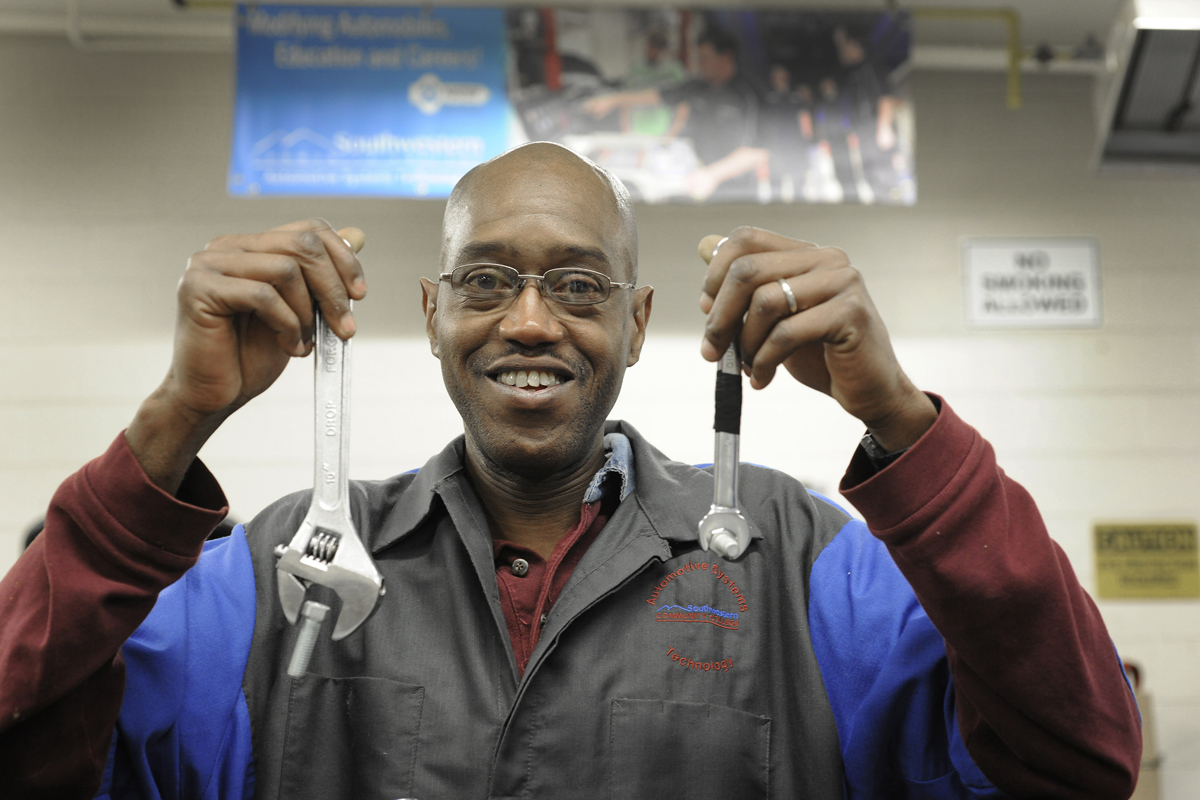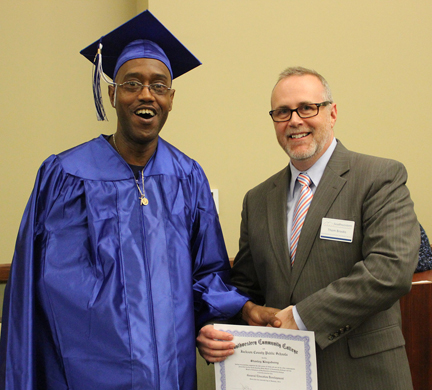 |
| Stanley Kingsberry, a student in Southwestern Community College’s Automotive Systems Technology program, holds prototypes of the Kingsberry Magnetic Wrench System for which he now owns a published U.S. patent. |
Roughly five years ago, Stanley Kingsberry was working underneath a Volvo diesel truck just outside of Fayetteville when a nut he’d just loosened fell and struck him square on the forehead.
Annoyed, he asked fellow mechanics if anyone had a magnetic wrench. No one in the garage had ever heard of such a thing, but someone did have a question that would ultimately change the course of Kingsberry’s life: “What are you going to do about it?”
Quite a lot, as it turns out.
Ideas for developing the world’s first magnetic wrench system began percolating in his brain. He sketched some designs, made his own prototype and secured a provisional patent in late 2011. After years of research and development, he received a published patent from the U.S. Patent Office in October of this year and is now literally sitting on a gold mine. Though offers are streaming in from companies across the nation, he’s holding out for a bid in the nine-figure range.
Kingsberry said he hopes to make a firm decision by March on whether to lease the idea to tool manufacturers or sell it outright.
“I named it the ‘Kingsberry Magnetic Wrench System’ to honor my father,” said Kingsberry, who’s currently a student in Southwestern Community College’s automotive systems technology program. “He was a master mechanic. When I was growing up, he was always asking me to come out and help him tear apart an engine or do some other work on a vehicle. I never wanted to back then. I always wanted to go out and play ball or do something else.”
Before Adock Kingsberry passed away in 2010, father and son got a good laugh out of Stanley’s choice of occupation considering that early reluctance to repair automobiles.
 |
| Stanley Kingsberry, left, received his GED in January from Dr. Thom Brooks, SCC's executive vice president for instruction and student services. |
Though Adock never got to see the invention, Stanley has felt his father’s presence throughout the long and often grueling process of securing the published patent while negotiating leasing and buying rights with tool companies.
“When the published patent arrived in the mail, and when I opened it up, I thought of my Dad,” said Kingsberry, who lives in Whittier. “He knows this is happening. My Dad has always been right here pushing me to stay on it. He’s been my guardian. Whenever I would get frustrated about how things were going, I would talk to Dad. Then the next day or two days later, I’d get a phone call, and the project would start moving forward again.”
Kingsberry’s patented system includes three potential methods manufacturers can use for magnetizing wrenches. His original sketches and prototypes feature three magnets, each drilled into a strategic location on the inner face of the wrench.
Other options include covering the entire gripping surface of the wrench in a magnetic strip or ferrofluid.
Right smack in the middle of efforts to ensure his invention would reach its potential, Kingsberry decided to return to school. He and his wife moved to Western North Carolina from Fayetteville in 2013, and he visited SCC’s campus seeking to update his skills.
He’d graduated from high school in the 1980s, but the process of transferring his transcript proved long and tedious. So he enrolled in Southwestern’s GED® preparatory classes and earned his high school equivalency in January.
 |
| Kingsberry holds his published U.S. patent. Pictured with Kingsberry are David Myers (left), program coordinator, and Hunter Braswell, instructor. Several of the magnetic wrenches Kingsberry invented are in the foreground. |
Over the summer, he entered the automotive systems technology program but never told anyone about his invention.
“I wanted to be treated just like any other student,” he explained. “I came here to learn. A lot of what I’d learned back in the ‘80s is now obsolete.
“I love this school,” he added. “They’ve done a lot for me. Miss Crystal (Snover) helped me when there were problems with my high school transcripts, and so many other people here have helped too: Mary Bradley (developmental math instructor), Mark Ellison (in Student Support Services), Toni Knott (Learning Assistance Center Coordinator) and Allan Grant (adjunct instructor).”
David Myers, SCC’s automotive program coordinator, found out about the magnetic wrenches indirectly.
“He’d written about it in a paper for one of his other classes,” Myers said. “I told him it’s a great idea. I’d seen a wrench that had a single magnet, but it didn’t work. His idea with multiple magnets is a great idea. I should have thought of it myself.”
For more information about the Kingsberry Magnetic Wrench System, visitwww.magneticwrenchsystems.com.
To learn more about SCC and its programs, call 828.339.4000.

